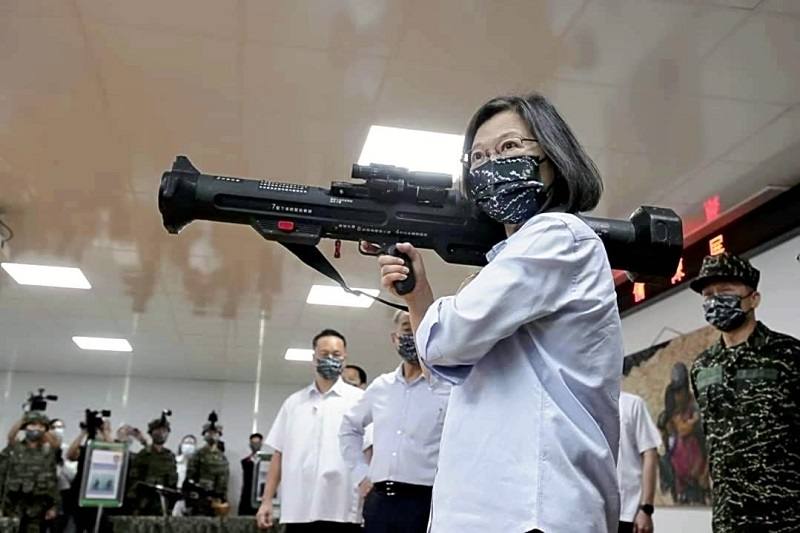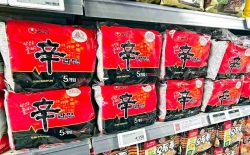
Taiwan’s President Tsai Ing-wen holds a domestically made hand-held missile launcher at a military facility in northern Taiwan on June 2.
13:41 JST, July 2, 2022
WASHINGTON / TAIPEI — The administration of U.S. President Joe Biden, taking note of Ukrainian resistance to the Russian invasion, is solidifying its intention of selling lightweight, mobile weapons such as anti-tank and anti-ship missiles to Taiwan in preparation for a possible Chinese incursion.
With the shift in policy, U.S. sales of antisubmarine patrol helicopters, self-propelled artillery guns and other such weapons sought by Taiwan have been shelved.
According to Taiwanese media, the Monterey Dialogue, a regular high-level security talk framework between Washington and Taipei, was held in the United States last month.
It is believed that the two sides discussed future weapon sales that focus on strengthening Taiwan’s “asymmetric capability,” making it able to counter an opponent with overwhelming military power through compact, mobile and inexpensive weapons.
The Ukrainian military has countered Russian superiority with weapons such as the Stinger, a hand-held surface-to-air missile, and unmanned attack drones. The Biden administration is becoming more convinced that Taiwan’s military needs to quickly fortify its defense capability with such weapons to likewise put up a defense should China decide to take the island by force.
In March, senior U.S. State Department officials and others made clear to the U.S.-Taiwan Business Council, which includes U.S. defense contractors, and other concerned parties that priority will be placed on Taiwan’s asymmetric capability in Washington’s sales of weapons.
Jeffrey Hornung, a senior political scientist at the Rand Corporation and specialist in East Asian security issues, agrees that putting vast resources into fighter jets and tanks, in which China has an overwhelming advantage, is not the best option for Taiwan.
Taiwan’s military has been oriented toward asymmetric warfare and has devised a strategy that, under the assumption that Chinese forces would be at their most vulnerable as they cross the Taiwan Strait, calls for attacking the enemy on its way to Taiwan and preventing it from securing a beachhead.
Doubts from within
Rupert Hammond-Chambers, president of the U.S.-Taiwan Business Council, said that along with high costs, the U.S. government cited the lack of applicability to achieving asymmetric capability as reasons for canceling the sale to Taiwan of heavy arms such as antisubmarine patrol helicopters.
However, observers point to the effectiveness of self-propelled artillery and ballistic missiles provided by the United States and European countries in ground battles that continue in eastern Ukraine. Hammond-Chambers criticized Washington’s policy, saying that it assumes only a land war, while overlooking the necessity of developing a capability to respond to constant Chinese military threats as well as the scenario of a naval blockade.
In mid-May, Taiwan’s Defense Ministry has also expressed doubts, saying that asymmetric warfare is an operation to disrupt the enemy’s objective of a quick and decisive war, not to decide what weapons and other munitions to choose. In its defense report released in November, self-propelled artillery was cited as a necessary weapon for strengthening offensive capabilities.
Chieh Chung, a senior assistant researcher at the National Policy Foundation that specializes in military affairs, said it would take several years to plan which weapons are needed and to deploy them. Given the increasing military pressure from China, concerns are growing about the delay in Taiwan’s military preparations. The Taiwanese side reportedly intends to hold further high-level discussions with the U.S. government.
Top Articles in World
-

Israeli Ambassador to Japan Speaks about Japan’s Role in the Reconstruction of Gaza
-

Videos Plagiarized, Reposted with False Subtitles Claiming ‘Ryukyu Belongs to China’; Anti-China False Information Also Posted in Japan
-

North Korea Possibly Launches Ballistic Missile
-

Chinese Embassy in Japan Reiterates Call for Chinese People to Refrain from Traveling to Japan; Call Comes in Wake of ¥400 Mil. Robbery
-

Pentagon Foresees ‘More Limited’ Role in Deterring North Korea
JN ACCESS RANKING
-

Japan Institute to Use Domestic Commercial Optical Lattice Clock to Set Japan Standard Time
-

Japan PM Takaichi’s Cabinet Resigns en Masse
-

Israeli Ambassador to Japan Speaks about Japan’s Role in the Reconstruction of Gaza
-

Man Infected with Measles May Have Come in Contact with Many People in Tokyo, Went to Store, Restaurant Around When Symptoms Emerged
-

Prudential Life Insurance Plans to Fully Compensate for Damages Caused by Fraudulent Actions Without Waiting for Third-Party Committee Review



















